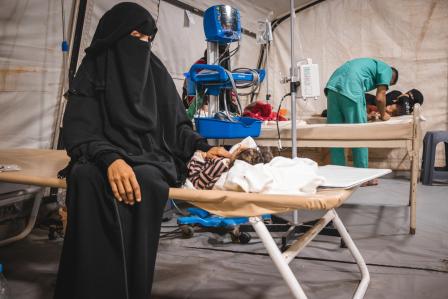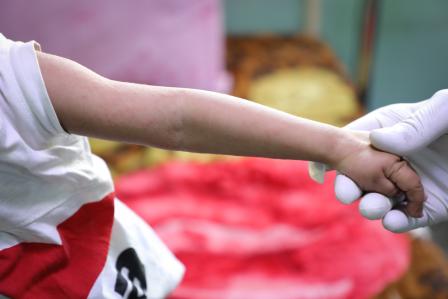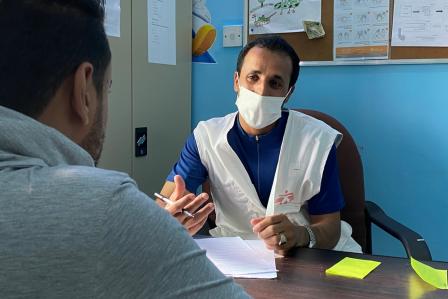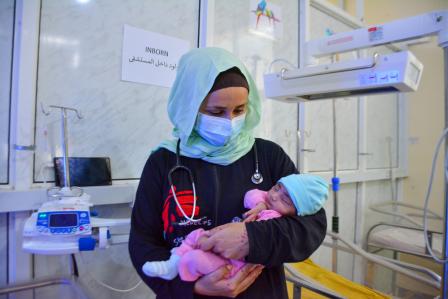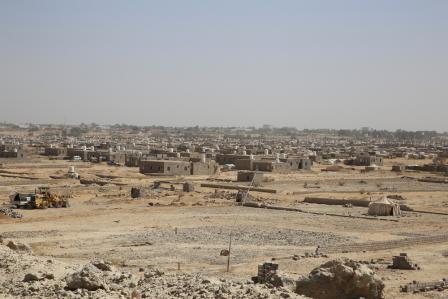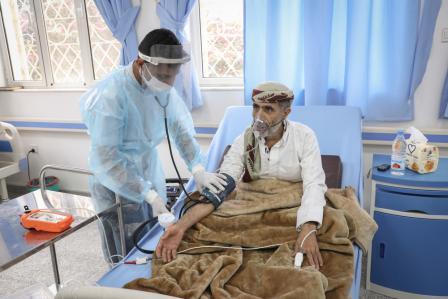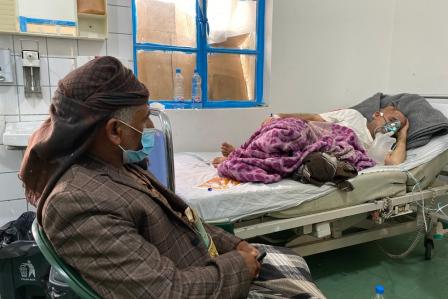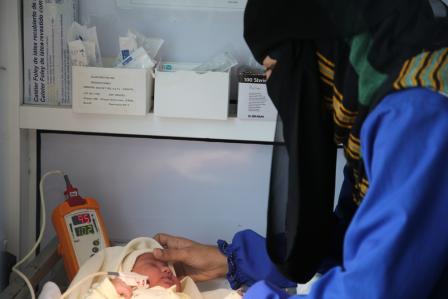Yemen: Thousands desperate for help in conflict-hit Marib
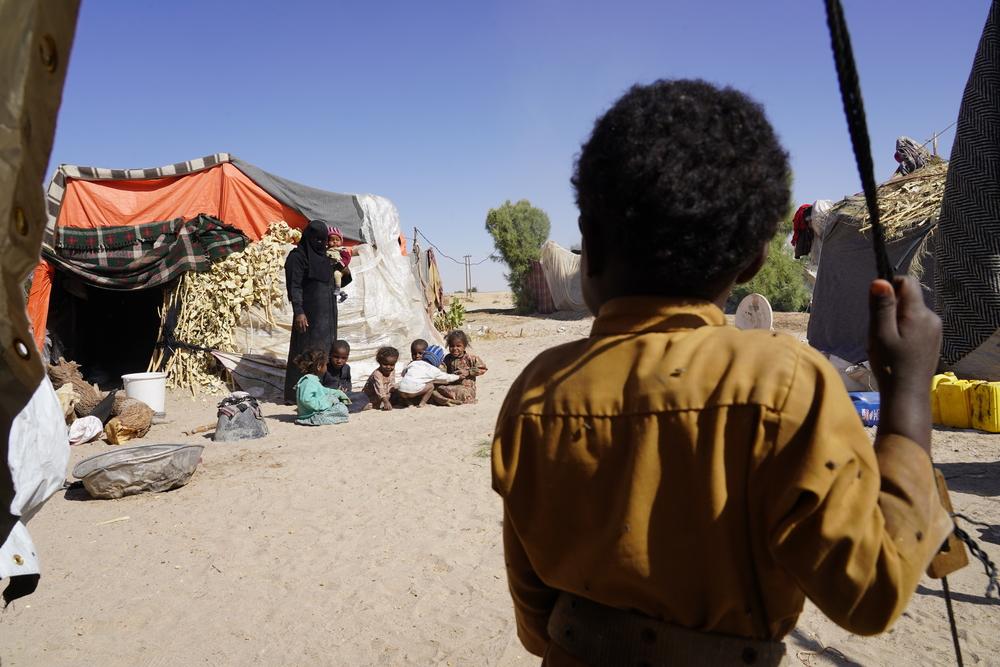
Children sit outside their tent in Al-Khuseif camp for internally displaced people in Marib. Yemen, 2021. © Hesham Al Hilali
“We don’t have blankets to cover ourselves,” says Aafia, one of thousands internally displaced people sheltering in Yemen’s Marib governorate. “My children have no warm clothes and I don’t have enough food to feed them. I don’t have a house made of bricks; it’s only a tent, which doesn’t even stop the wind during cold winter nights. I don’t complain though. A complaint to anyone other than God is a humiliation.”
The scene in Marib is a gloomy snapshot of how millions of Yemenis are suffering as a result of the seven-year-long conflict. About 150 formal and informal sites, both large and small, host thousands of families who have sought safety in Marib from across the country. An even larger number of displaced people are staying at the homes of local people.
As the conflict spread, Yemenis from across the country migrated to Marib, previously considered as the safest place in the country. Development to infrastructure and increased economic opportunities over recent years had also made Marib an attractive location to move to. Today however with the escalation of conflict, the situation in Marib has changed according to the many displaced people.
Violence in Marib governorate is intensifying as the warring parties fight to claim their control over an area that is important for its geographic location, oil and gas resources and military weight. A city with a former population of less than a half million, according to local authorities, is now home to close to three million people. For many of them, Marib can offer nothing more than a life in precarious conditions. Most of the displaced people are totally reliant on humanitarian assistance, although it does not always reach them.
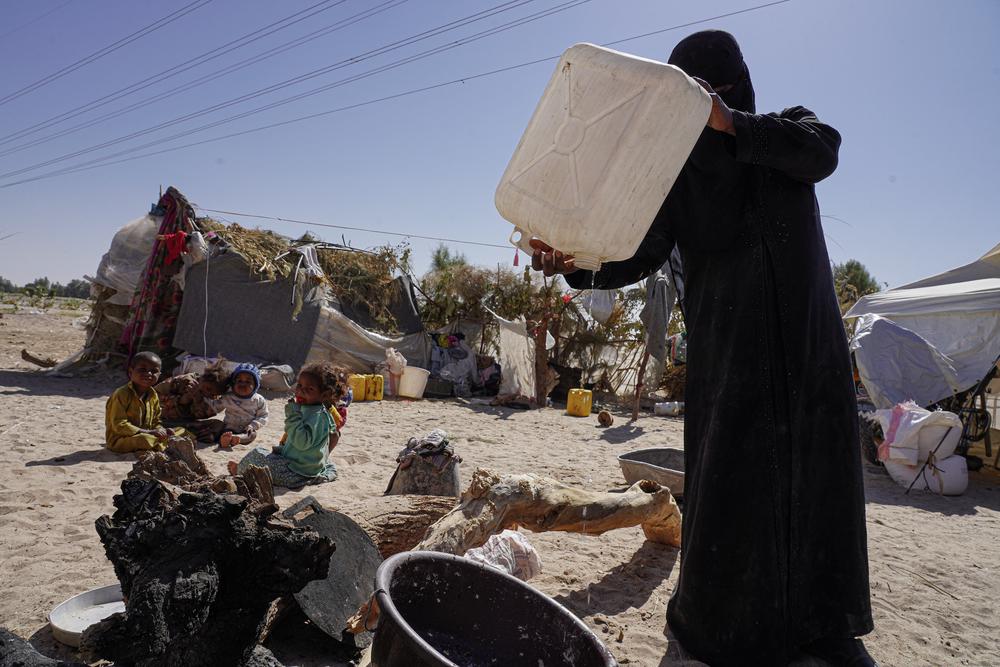
A woman pours the last drops of water from a bottle to prepare food next to her tent in the Al-Khuseif camp for internally displaced people in Marib. Yemen, 2021. © Hesham Al Hilali
Abdu Sabit is one of many people waiting for humanitarian assistance to arrive. He has no means of earning money to support his extended family of 31 people, who share two small tents in Marib’s Al-Khuseif site.
“We only take tea and bread all day long,” says Abdu, who is originally from Taiz and has been displaced twice already. “It has been a month since I and my family had a proper meal. We would take anything given to us as help.”
Getting hold of enough to eat is not the only problem faced by the displaced people. Many of those living in camps set up in and around the city lack basic necessities including shelter materials, blankets, clean water and latrines. Many of the temporary shelters have been constructed from bushes and branches plucked from the desert, or from plastic sheets or other fragile materials salvaged from rubbish dumps. Safe drinking water is either scarce or available in very limited quantity. In this dusty and sandy environment, many people live without latrines and showers.
Winter in the desert of Marib is merciless with strong cold winds and temperatures falling below 10°C. Without mattresses to sleep on or blankets to cover themselves with, many people struggle to keep warm. Some have built walls of sandbags to try and prevent the cold wind from entering their homes. The precarious and unhygienic living conditions and the lack of safe water are a major health risk.
Aid response is inadequate
Teams from Doctors Without Borders / Médecins Sans Frontières (MSF) have been providing basic medical services through eight mobile clinics and a primary healthcare centre. They have been receiving increasing number of patients, especially children, suffering from diseases related to the poor sanitation and harsh living conditions. In the three months from October to December 2021, Doctors Without Borders teams saw a 44 percent increase in patients on the previous three months; 66 percent of these patients were children. There was also an 11 percent increase in malnutrition cases.
Marib’s humanitarian crisis could result in a health crisis. The consequences of people’s living conditions on their physical and psychological wellbeing are already alarming. There is a high risk of disease outbreaks including measles, cholera and COVID-19. Health and humanitarian organisations need to act proactively to prevent a catastrophic health situation. Organization working in Marib must increase their activities with regards to food, water and sanitation, shelter and healthcare.Dr Muhammad Shoaib, Medical Coordinator
In 2021, Marib witnessed multiple violent attacks resulting in mass casualties and displacement. More than 78,000 individuals were displaced within or to Marib governorate last year, out of which around 60,000 were displaced since September, estimates the International Organization for Migration (IOM). Intense fighting continues on the city’s outskirts, causing yet more people to be displaced from their homes, and presenting a constant threat to those who arrived in the area in search of safety.
“We really feel afraid, day and night,” says Abdu, whose family are sheltering just a few kilometres from the frontline. “Usually, there is a break of an hour or so and then we start hearing fighting again. I am not worried for myself, but for the children in my family. If there is a situation when we feel the explosions are coming closer, we will just take some water and run. I don’t know where we’d go – we would just run away.”
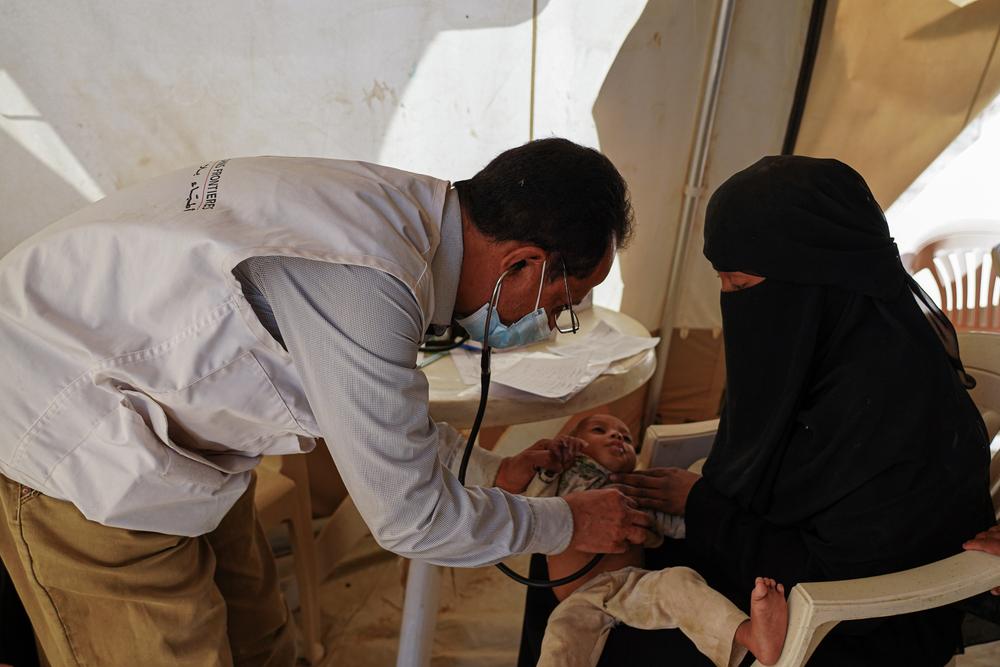
Doctors Without Borders doctor examining one-year-old Mahsan at the Al-Hussun mobile clinic in Marib. Yemen, 2021. © Hesham Al Hilali
Conflict brings more misery to people who are already vulnerable
The effects of the conflict are having a particular impact on two of the area’s most vulnerable groups: African migrants and the Muhamasheen community [literally ‘the marginalised ones’, a minority ethnic group who frequently face discrimination and live in deep-seated poverty]. Even when the frontline shifts, putting their lives at risk, these people often lack the capacity and resources to move to safety.
The arrival of newly displaced people in the area is putting Marib under increasing stress in terms of meeting people’s needs for food, shelter, water, sanitation and other basic necessities. The humanitarian assistance available is insufficient for people’s needs, and many migrants have seen their aid reduced or shared with other vulnerable groups.
“We are 40 women living in one tent,” says 20-year-old Arkani, one of hundreds of migrants from Ethiopia currently stuck in Yemen during their quest to cross the border into Saudi Arabia.
The conflict and its consequences have also brought more misery to the Muhamasheen, of whom a large number now live in Marib, since moving to the governorate from other parts of the country to escape conflict and look for economic opportunities.
“Food, shelter and water – that is it,” says Ahmad, a member of the Muhamasheen. “We don’t want to have a big house or buy land. All we need is food, shelter and blankets in winter.”
Marib is in an emergency situation. The population – especially the vulnerable groups such as displaced people, migrants and the Muhamasheen – are severely affected by the multiple displacements that they have gone through and are surviving without even basic necessities. Aid organisations were simply not ready for displacement on this scale. The authorities too, despite their efforts, have a challenge to deal with such large influx of IDPs. The conflict in Marib is unlikely to end soon. We fear more displacement, resulting in more needs. As a humanitarian community, we need to act to address the current needs, while thinking ahead and preparing for a possible increase of needs in the near future. Marib is a classic example of what the people of Yemen are going through. As the governorate makes headlines because of the security incidents and frontlines, we must not forget that the whole country is suffering from consequences of the long standing war.Elisabeth Bijtelaar, Head of Mission
